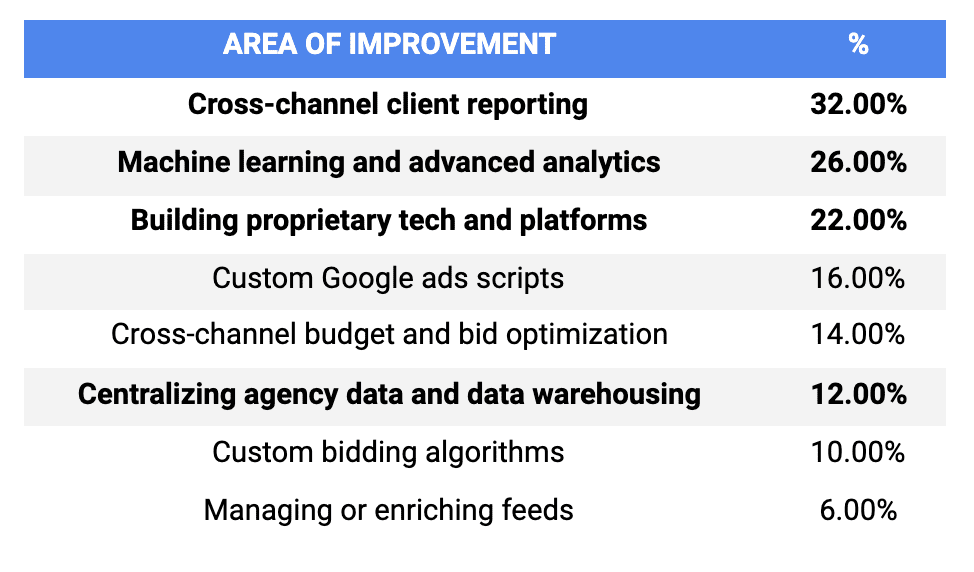Have you ever wondered what other agencies are prioritizing over the next half year and where they want to improve the most? You don’t often get a scoop of your competitors’ strategic priorities, but today you do!
As a technology services provider for digital marketing agencies, we do market research in regular intervals to make sure our training and hiring are aligned with the strategic priorities of the agencies we work with and the industry at large.
Today I’m sharing some interesting findings from market research we conducted in the first half of 2021 that will be interesting to anyone leading a paid media team.
We asked a random sample of heads of paid media in the UK and the US in which areas they would like to see their team improve the most over the next year.
Here are the results:

The leading categories aren’t all that surprising.
“Cross-channel client reporting” is the stage of the value chain when your customers see “what you’ve done” and with many generic reporting tools out there it’s not surprising that 32% of agency leaders said they want to improve here.
Similarly, 26% said they want to improve their approach to machine learning and advanced analytics, and those are not just a buzzword anymore! Research shows that larger brands expect more sophistication in this area and seek to integrate more machine learning in their marketing approaches – so that makes sense.
One in every 5 agencies told us they want to focus more on building proprietary tech and platforms. Again, it’s a great differentiator for agencies in pitches and can really make a difference in paid media delivery.
So what is surprising?
Only 12% said they were going to focus on centralizing agency data – even though it’s really the foundational step to all the top three priorities that our respondents mentioned. Let’s get into it.
Think of a data warehouse as a central hub for all your agency’s data. You join and process data from various channels and sources, prepare cross-channel data for reporting, push it out to data visualization platforms for reporting purposes, and run advanced analytics and machine learning algos across these datasets.
Unlike data visualization platforms, data warehouses like Google’s BigQuery are designed to store and process large datasets – so they are also the answer to Data Studio and Google Sheets performance issues.
If you are experiencing slow reports and are using connectors like Supermetrics, Funnel, Adverity, or TapClicks to pull the data, this post on why BigQuery is the way to fix Data Studio performance issues will be helpful.
And because a data warehouse like BigQuery allows you to prepare and manage huge datasets it’s also typically the backend of highly impactful proprietary tools and platforms in digital marketing.
Why is data warehousing a strategic imperative for 2021/22?
Given the data intelligence and automation options that a data warehouse opens up, it’s quite naturally a part of our scoping conversations with agencies that want to build proprietary tech and platforms with us or improve their reporting and analytics capabilities.
Our CTO actually wrote another PPC Hero post about how you can use a data warehouse to introduce an affordable and scalable approach to cross-channel reporting and building advanced solutions for automated optimizations across multiple channels.
And if you’re thinking about leveraging machine learning, then the easiest way to highlight how important data warehousing is for this approach is to point out that Google provides free machine learning algorithms for use with its BigQuery data warehouse.
Then why aren’t more agencies focusing on data warehousing?
It’s understandable that it can seem daunting to focus on the fundamentals if you don’t have data engineers, developers, and data scientists in-house. In fact, it’s usually only the bigger agencies that have this kind of talent on payroll, and they are typically also the ones that use data warehousing effectively to gain more advanced analytics and as the backend for proprietary tools.
What’s becoming increasingly clear is that more agencies are gravitating towards data warehousing to tackle challenges like data silos, introducing more advanced client reporting and analytics, and improving agency-wide insights. The underlying technologies, like Google’s BigQuery data warehouse, have become very accessible – especially when you are working with data engineers and developers that specialize in digital marketing technology.
Ultimately, investing in proprietary tech opens up a host of opportunities to differentiate your agency, especially the kind that helps you and your clients gain more advanced insights.




